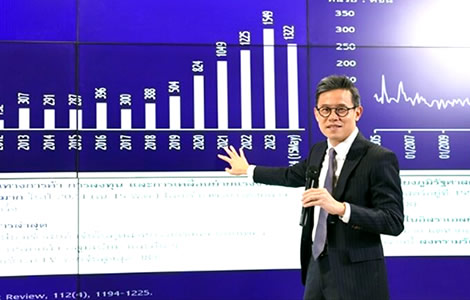Good news for Thailand as S&P retains BBB+ rating despite lower GDP outlook and ฿500 billion Digital Wallet plan. Kingdom jumps ahead of the UK and New Zealand in global competitiveness.
There was some good news for beleaguered Thai economic planners in the last week. Firstly, the ratings agency S&P intends to preserve the country’s BBB+ rating. S&P said it would do so for 1-2 years even if the government’s flagship Digital Wallet policy goes ahead. It came even as Thai economists revised projected growth for the year. Meanwhile, the Bank of Thailand is highlighting a rising number of new business and factory investments for May 2024. In addition, Thailand has jumped in the latest IMD World Competitiveness Centre table just released. The kingdom was ranked ahead of countries such as the United Kingdom, New Zealand, and Malaysia, coming in 25th place from the 30th position last year.

On Tuesday, the Economic Intelligence Centre (EIC) of Siam Commercial Bank revised its 2024 growth projection for Thailand from 2.7% to 2.5%. In recent weeks, Krungthai Bank’s research unit has revised the projection to 2.3%.
The main reason for this are rising challenges for Thailand’s exports amid geopolitical instability. In addition, the political situation at home is undermining confidence.
Political instability is beginning to weigh heavily on economic confidence. However, the economy continues to show growth pattern even if subdued
Mr Somprawin Manprasert, Chief Executive Officer of the centre, explained that if the Prime Minister is removed from office by the Constitutional Court, it will upend the Thai government.
In the meantime, the bank’s research group noted that the economy is still growing. Thailand recorded 1.9% growth last year.
‘Most components of the Thai economy decreased from what was previously assessed, especially export and increased vulnerability in the household sector, including added political factors affecting the uncertainty of the Thai economy.’
‘Because if the government changes its policy, it will be affected. Investment uncertainty has increased. SCB EIC, therefore, revised the GDP estimate for the second time due to increased uncertainty,’ he told his audience.
Credit lines for consumers are tight as inflation rises with a sudden jump to 1.54% in May 2024. Siam Research House predicts one cut in interest rates
The economic research unit, in particular, noted that credit lines remained tight. At the same time, underlying inflation is starting to rise. In effect, there is the beginning of a cost of living crisis.
Inflation rose 0.4% in April but surprised analysts by jumping to 1.54% in May.
On one hand, the bank economists saw a need for government stimulus.
Certainly, the government’s planned ฿500 Digital Wallet giveaway will achieve this. However, it will be accompanied by a corresponding long-term public debt burden.
In conclusion, the EIC thought that an interest rate drop of 25 basis points might happen before the end of 2024. This would come in response to eventual market easing in the United States.
Afterwards, the Siam Commercial Bank unit is predicting a further 25 basis point drop at the start of 2025, bringing the base borrowing level to 2%.
Bank of Thailand briefs media on rising factory and business closures suggesting that new and better-capitalised business concerns are opening, no concern
At the same time, the Bank of Thailand itself emerged to brief media outlets on concerns over rising factory closures.
Economists have expressed concern that Thailand is losing a large proportion of its 2nd and 3rd generation industrial base.
Firstly, it explained that such closures are part of the natural give and take of any dynamic economy. Inefficient factories and those that cannot compete must close.
Thai government urged to act to preserve the country’s auto industry which is fighting for survival
PM Srettha blames the stock market fall on politics but the trend is linked to fundamental economic decline
Lack of coherence in government policy is the root cause of Thailand’s massive economic problems
At the same time, it pointed towards an uptick in April and May 2024. This is related to factory openings in May and business registrations in April.
The briefing was given by Mr Piti Disyatat, the assistant governor of the Monetary Policy Committee unit. He referred to data from the Department of Industrial Works.
Investment in factories was ฿16.8 billion in May 2024
He went on to point out that in May 2024, 171 new factories opened. The 2023 figure was 143. In addition, the total investment in new factories rose to ฿16.8 billion last month. In contrast, in 2023, this figure was ฿8.12 billion.
The central bank executive also pointed to a rise in business registrations in April 2024 compared to April 2023. An 8.09% increase saw this reaching 6,530 compared to 6,041 the year before.
Correspondingly, business closures dropped in the same period. There were 936 in April 2023 and 810 this year. That is a fall of 13.5%.
Meanwhile, the bank boss stated that access to liquidity for firms was a problem. In particular, for small and medium-sized industries.
He noted a government initiative to inject ฿50 billion into this area under its ‘Ignite Thailand’ scheme signed off by the cabinet last week.
Credit for households in Thailand in 2024 is in a deleveraging mode as banks and financial institutions face up to the country’s chronic bad debt issues
Presently, access to credit for firms has remained strict since 2023. Clearly, this is not good.
However, credit has actually been tightened or deleveraged in the targeted household sector. It comes as banks and financial institutions are now facing up to loan problems.
Especially in relation to hire purchases on big-ticket items such as cars.
Meanwhile, last Thursday, there was good news for the government when S&P, a key ratings firm, signalled its intention to keep Thailand’s BBB+ Sovereign rating with a stable outlook.
Indeed, the firm said it would do so for the next 1-2 years even with the government’s flagship Digital Wallet scheme going ahead.
S&P committed to keeping the country’s BBB+ rating
Undoubtedly, there has been some concern in the business community and in government circles about this. The ratings agency praised the government for its prudent management of public finances.
While noting a rising public sector debt level and an expanding deficit, the firm said it was in line with its peers in this category.
Certainly, it noted that Thailand from 2010 to 2023 has only grown on average by 1.8% per annum.
In contrast, Malaysia achieved 3.1%, the Philippines and Indonesia 3.4% while Vietnam led the way on 4.9%.
A seminar last Thursday heard from Kim Eng Tan, the managing director for Asia-Pacific at S&P Global Ratings relating to sovereign ratings.
‘The existing outlook is stable for the Thai BBB+ rating and we don’t anticipate adjusting the rating for 1-2 years unless there are significant changes in the Thai economic outlook,’ he disclosed.
The S&P executive still explained away rising government debt to GDP as due to the after-effects of the pandemic shutdown on Thailand’s economy.
Mr Tan however accepted that in the longer term, Thailand must become more competitive.
Thailand rose to 25th place in key world competitiveness rankings from 30th position last year ahead of Malaysia, the United Kingdom and New Zealand
As if in response, later on Tuesday, Mr Danucha Pichayanan of the National Economic and Social Development Council (NESDC) addressed the cabinet.
He revealed a surprisingly positive performance by Thailand in the IMD World Competitiveness Centre for 2024.
The survey conducted across 67 key economies which excluded Vietnam, saw Thailand coming out in 25th place.
For instance, the kingdom out-ranked countries such as the United Kingdom (28), New Zealand (32), India (39), Poland (41), and the Philippines (52).
Significantly, it was at the same time ahead of Austria (26) and Malaysia (34).
The survey was led by Singapore, leaving Thailand in second place in ASEAN. Switzerland was 2nd, Denmark 3rd, Ireland 4th, Hong Kong 5th, and Sweden 6th.
Thailand scored well in 2024 for an improvement in its current account as well as its trade engagement worldwide. On this score, it rose 23 spots from 29th last year to 6th in 2024.
Still ranked low on education, health and environment
The country stayed unchanged in government efficiency and infrastructure. It gained in business efficiency and management practices, adding to overall attitudes and approaches within the private sector.
Certainly, this may be a reflection of the optimism generated by the new government which came to power in September 2023.
Notably, however, the kingdom’s overall score this year fell from 74.5 points to 72.5. This came as countries worldwide appeared to be impacted by rising geopolitical problems.
In short, competitiveness is taking a back seat to bigger threats.
Speaking of problems, Thailand’s ranking in terms of education saw it at 54, unchanged. It also dropped to 55th for health and the environment.
Join the Thai News forum, follow Thai Examiner on Facebook here
Receive all our stories as they come out on Telegram here
Follow Thai Examiner here
Further reading:
Thai government urged to act to preserve the country’s auto industry which is fighting for survival
Lack of coherence in government policy is the root cause of Thailand’s massive economic problems
Disturbing questions that must be confronted over Thailand’s reeling economy are China and EV cars
First-quarter GDP growth surprises analysts based on higher tourism and consumer spending growth
Central bank holds interest rates. Economy will grow 2.6% in 2024 as Srettha pushes home ownership
Economy unlikely to grow in first quarter as Thai manufacturing crumbles. Hard choices ahead
New Finance Minister expected in April as economic malaise deepens with downgrades in GDP growth


















